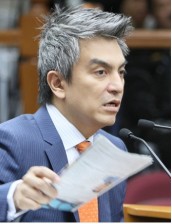
Rep. Toby Tiangco, campaign manager of UNA. INQUIRER FILE PHOTO
Will another massive power interruption leave voters literally in the dark on Monday?
Vice President Jejomar Binay’s political coalition is seeing a “daang madilim” (dark path) leading to Election Day on Monday in light of the massive blackout that hit parts of Luzon, including Metro Manila, on Wednesday.
The United Nationalist Alliance (UNA) on Thursday said the power interruptions “brought anxiety and panic to the voting public, bringing back the grim scenario of the 2004 and 2007 elections, which were marred by wholesale electoral fraud.”
“I hope it was not a dry-run for the May 13 elections,” Rep. Toby Tiangco, UNA campaign manager, told the Inquirer by phone.
UNA used the term “daang madilim” in a press statement to refer to the Mindanao-wide blackouts that have hit the southern provinces and which, according to UNA, “have now reached Luzon.”
It was also a play on President Aquino’s campaign slogan, “daang matuwid” (righteous path), which is also used by the administration’s senatorial slate.
Not the only worries
Prior to the Luzon blackout, Binay’s senatorial ticket expressed fear the power crisis in Mindanao might jeopardize its chances on Election Day. It was concerned that the blackouts might disenfranchise voters in the region, a political bailiwick of the opposition, particularly of former President Joseph Estrada, a senior leader of UNA who is running for mayor of Manila.
A Department of Energy (DOE) official on Thursday blamed Wednesday’s power failures on the simultaneous tripping of a 230-kilovolt transmission line and a coal-fired power plant, affecting seven facilities in the provinces of Batangas, Quezon and Pangasinan—roughly 45 percent of total power demand.
Malacañang said President Aquino had been assured it would not happen on Monday.
But power outages were only some of the worries of the opposition.
Artists at cheating
Tiangco also warned of “less-than-honest characters around (Aquino) who have a different agenda and who have been schooled in the art of election-rigging.”
“UNA votes can be shaved in areas where they are strong and administration party votes can be padded in their bailiwicks,” Tiangco said in the press statement.
“This may not happen but we can never underestimate the venality of those who have lofty ambitions and whose loyalty is not with the President but with themselves alone… They are capable of peddling the lie that what they are doing is for his party.”
Tiangco made an effort to keep Aquino out of any election fraud scenario, saying the President “has shown admirable integrity.”
“We are confident that he wants clean elections as much as we do,” Tiangco said.
Security features removed
UNA was also concerned about how the Commission on Elections would supervise the voting.
Tiangco alleged that the Comelec had removed crucial security features in the precinct count optical scan (PCOS) machines and that rewritable compact flash cards—not the “write once-read many” or WORM-type cards—would be used.
“This means the embedded program can be altered. And the PCOS machines no longer have the vote verification receipt with which voters can check if his ballot was read right,” Tiangco said.
Who will enter passwords?
The UNA was also wary that Comelec technicians, not teachers, would be tasked to enter passwords to boot the PCOS machines.
“It does not inspire confidence that one person with access to the compact flash card carried by any one of the machines can corrupt the result, a recipe for ‘dagdag-bawas’ (vote padding and shaving),” said Tiangco.
Originally posted at 9:30 pm | Thursday, May 9, 2013